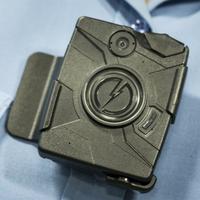When Police Are Given Body Cameras, Do They Use Them?
ARUN RATH, HOST:
At the top of the hour, we heard from Ferguson, Mo., where the protests following the police shooting of Michael Brown continue. That incident and others have led to calls for the use of body cameras that would record police encounters with the public. The Denver Police Department has been trying them out.
NOELLE PHILLIPS: They're fairly small, maybe look like a pencil. And they can be clipped onto the chest, or they can be clipped onto the glasses. And then they wear, like, a little iPod-sized box with an on-and-off button that they can push.
RATH: That's Noelle Phillips of the Denver Post. After a six month pilot program, 800 Denver cops will start wearing body cameras later this year. Officers are supposed to start recording as soon as they respond to a call or enter a scene. But Phillips says that a report by an independent monitor found that in many cases involving the use of force, the cameras weren't rolling. PHILLIPS: About only 1 in 4 use-of-force incidents were actually recorded by the body cameras. And he was counting the actual punch, baton strike, spraying with mace, Taser shocks. And he said a lot of them were missed because either the people involved weren't assigned cameras, like sergeants or cops working off-duty security at bars. There was also officers forgot to turn them on or said the situation deteriorated too quickly and we didn't have time. Or there was a technical malfunction, and the thing just wasn't working. RATH: So that sounds kind of spotty. What was the Denver Police Department's response? PHILLIPS: They've objected to the monitor's findings. They've said his evaluation was outside the scope of their pilot project. It wasn't fair to count uses of force involving people who were not assigned the cameras. And they offered a much higher percentage of incidents that were recorded.
RATH: And a number of these incidents involved off-duty police officers. Could you explain that?
PHILLIPS: So this happens in a lot of police departments across the country. Parades, special events, bars, liquor stores hire police officers to work security for them. But while the officers are working, they're wearing their uniforms. They're bound by the department's policies and practices. They really still represent the police department even though they're not at that point working in official police assignment. RATH: Are they required to use the camera then when they're in those off-duty situations? PHILLIPS: During the pilot project, off-duty officers did not wear the cameras. Going forward, we don't know how they're going to issue these cameras and use them. It's something for the city to talk about. Later this year, they're going to field about 800 body cameras for a force that has about 1,400 officers. RATH: And for the incidents that were recorded, were there any use-of-force incidents that were investigated using video from body cameras?
PHILLIPS: Yeah. I wrote about one that involved some kind of disturbance on the Denver 16th Street Mall. It's a long strip with a bunch of shops and restaurants and nightclubs. So there's a fight in daylight. Seven officers went. And the suspect started kicking at officers while he was handcuffed. And one officer used his knee to pin the guy by the neck. That's against department policy. So the Police Department reviewed that and decided yes, that was excessive force. It was inappropriate, and the officer was suspended for four days. Now, during that incident, there were seven officers who responded, but only three captured the actual use of force with their cameras.
RATH: So Noelle, there have been similar kinds of findings about police body cameras in other cities - Rialto, Calif., New Orleans. Do you have a sense that there are things that are going to change or lessons for police departments going forward?
PHILLIPS: Absolutely. The independent monitor said from the beginning that he wanted to evaluate this and take a look at it as the policy is being developed so that it can be the best that it can be rather than letting it go for a year and saying, oh, whoops, we found all these problems. This is important. Police departments all over the country are saying we're going to use body cameras - that they will tell us what happens when things go south and things turn violent with officers in the general public. So lots of groups are saying, hey, let's consider all these recommendations. How does the technology work? And make it the best that it can be.
RATH: Noelle Phillips covers crime and police for the Denver Post. Noelle, thanks very much.
PHILLIPS: You're welcome.

